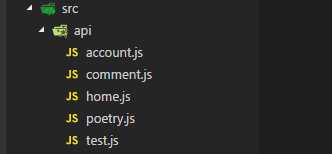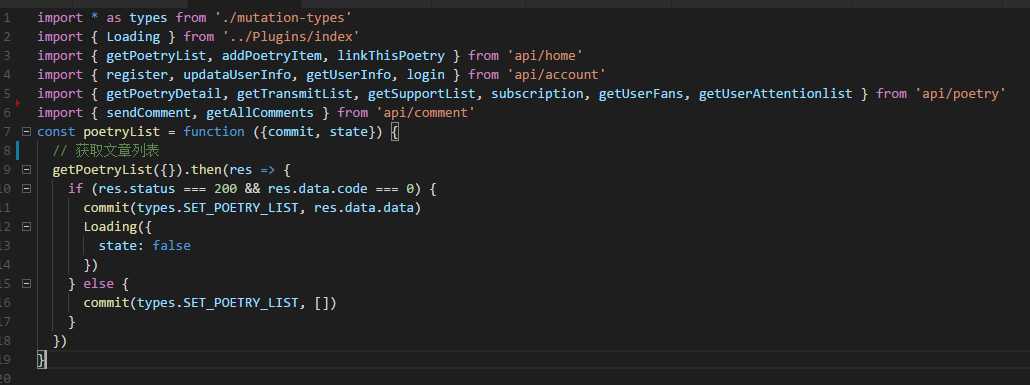标签:with RoCE for tran amp common str params 使用
一、使用vue-cli脚手架构建
1 <!-- 全局安装vue-cli --> 2 npm install -g vue-cli 3 <!-- 设置vue webpack模板 --> 4 vue init webpack my-project 5 <!-- 进入项目 --> 6 cd my-project 7 <!-- 安装依赖 --> 8 npm install 9 <!-- 启动项目 --> 10 npm run dev
二、安装axios并统一处理请求接口(二次封装axios)
1.安装
npm install axios --save
2.获取当前域名
1 export default function getBaseUrl (type) { 2 let [baseUrl, protocol] = [‘https://xxxxxxx‘, ‘http://‘] 3 // 判断协议 4 if (location.protocol === ‘https:‘) { 5 protocol = ‘https://‘ 6 } 7 if (location.hostname !== ‘localhost‘) { 8 baseUrl = protocol + location.hostname 9 } 10 return baseUrl 11 }
3.封装axios
import axios from ‘axios‘ import qs from ‘qs‘ import getUrl from ‘./baseUrl‘ import i18n from ‘../../language‘ // 配置axios的config const language = ‘mx‘ let config = { // `baseURL` 将自动加在 `url` 前面,除非 `url` 是一个绝对 URL。 // 它可以通过设置一个 `baseURL` 便于为 axios 实例的方法传递相对 URL baseURL: getUrl(), // `withCredentials` 表示跨域请求时是否需要使用凭证(登陆的时候会有cookie这个时候要用到) withCredentials: true, headers: { // 设置 ‘Content-Type‘: ‘application/x-www-form-urlencoded‘ }, transformRequest: [function (data) { // 处理发送前的数据 data = qs.stringify(data) return data }], data: { // 全局参数 channelType: ‘6‘, channelTag: ‘6_7_0_0‘, language: language } } // 拦截请求 axios.interceptors.request.use((config) => { // console.log(‘请求前‘) if (channelType) { config.data.channelType = channelType } if (channelTag) { config.data.channelTag = channelTag } return config }, error => { return Promise.reject(error) }) // axios拦截响应 axios.interceptors.response.use((data) => { let resdata = data if (data.data.errCode === 3 && data.data.retCode === 3) { } return data }, error => { return Promise.reject(error) }) const get = (url, params) => { url = urlEncode(url, params) return axios.get(url, config) } const post = (url, params, con) => { return axios.post(url, params, config) } // 用来拼接get请求的时候的参数 let urlEncode = (url, data) => { if (typeof (url) === ‘undefined‘ || url === null || url === ‘‘) return ‘‘ if (typeof (data) === ‘undefined‘ || data === null || typeof (data) !== ‘object‘) return url url += (url.indexOf(‘?‘) !== -1) ? ‘‘ : ‘?‘ for (let k in data) { url += ((url.indexOf(‘=‘) !== -1) ? ‘&‘ : ‘‘) + k + ‘=‘ + encodeURI(data[k]) } return url } export { get, post }
4.在src目录下新建api文件夹(该文件夹下我们放置我们所有的请求接口)如下图

三、引入vuex进行状态管理
在src目录下新建store文件夹,然后依次新建actions.js/getters.js/index.js/mutation-types.js/mutation.js/state.js
index.js
import Vue from ‘vue‘ import Vuex from ‘vuex‘ import * as actions from ‘./actions‘ import * as getters from ‘./getters‘ import state from ‘./state‘ import mutations from ‘./mutations‘ import createLogger from ‘vuex/dist/logger‘ Vue.use(Vuex) const debug = process.env.NODE_ENV !== ‘production‘ export default new Vuex.Store({ actions, getters, state, mutations, strict: debug, plugins: debug ? [createLogger()] : [] })
2.getter.js
const getPoetryList = state => state.poetryList const getPoetryItem = state => state.poetryItem const getUserInfo = state => state.userinfo const getcommentlists = state => state.commentlist export { getPoetryList, getPoetryItem, getUserInfo, getcommentlists }
3.mutation-types.js
const SET_POETRY_LIST = ‘SET_POETRY_LIST‘ const SET_POETRY_ITEM = ‘SET_POETRY_ITEM‘ const SET_USER_INFO = ‘SET_USER_INFO‘ const SET_COMMENT_LIST = ‘SET_COMMENT_LIST‘ export { SET_POETRY_LIST, SET_POETRY_ITEM, SET_USER_INFO, SET_COMMENT_LIST }
4.mutation.js
import * as types from ‘./mutation-types‘ const mutations = { [types.SET_POETRY_LIST] (state, list) { state.poetryList = list }, [types.SET_POETRY_ITEM] (state, item) { state.poetryItem = item }, [types.SET_USER_INFO] (state, userinfo) { state.userinfo = userinfo }, [types.SET_COMMENT_LIST] (state, commentlist) { state.commentlist = commentlist } } export default mutations
5.actions.js(用来进行异步操作)

四、设置过滤器(这里是一个简单的时间过滤器)
在common目录下的js文件夹内新建filter.js
1 const forMatDate = utc => { 2 if (utc) { 3 let date = new Date(utc) 4 let y = date.getUTCFullYear() 5 let M = date.getUTCMonth() + 1 >= 10 ? date.getUTCMonth() + 1 : `0${date.getUTCMonth() + 1}` 6 let d = date.getUTCDate() >= 10 ? date.getUTCDate() : `0${date.getUTCDate()}` 7 let h = date.getUTCHours() + 8 >= 10 ? date.getUTCHours() + 8 : `0${date.getUTCHours() + 8}` 8 let m = date.getUTCMinutes() >= 10 ? date.getUTCMinutes() : `0${date.getUTCMinutes()}` 9 let s = date.getUTCSeconds() >= 10 ? date.getUTCSeconds() : `0${date.getUTCSeconds()}` 10 return `${y}-${M}-${d} ${h}:${m}:${s}` 11 } 12 } 13 14 export { 15 forMatDate 16 }
在main.js中设置过滤器

上面四个步骤,是一个vue项目的简单设置,当然不是很全面,但是对于我们这个项目却是足够了,至于里面用的的一些插件什么的,我们后面再一一介绍。。。。
一个关于vue+mysql+express的全栈项目(二)------ 前端构建
标签:with RoCE for tran amp common str params 使用
原文地址:https://www.cnblogs.com/songdongdong/p/9407312.html